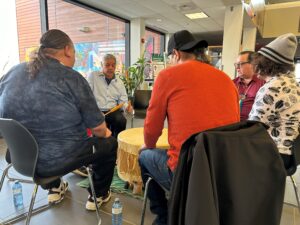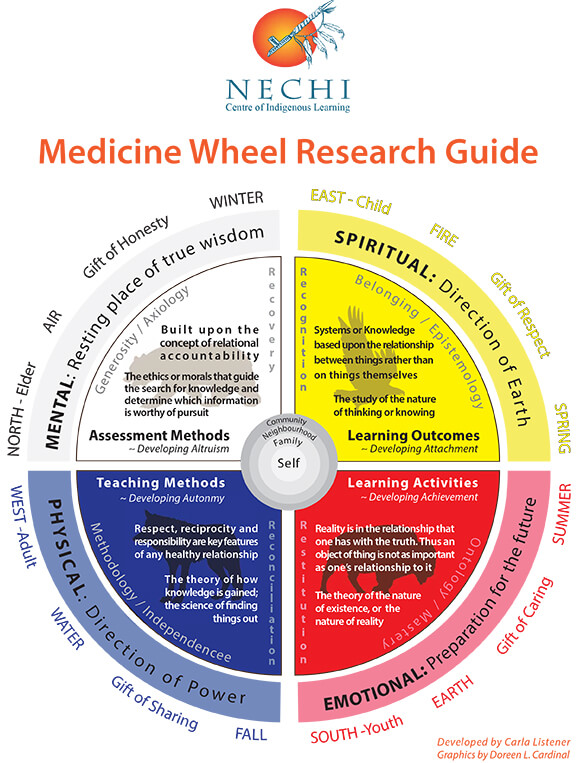Indigenous Services
Algonquin College is located on the unceded and unsurrendered territory of the Algonquin Nation. We acknowledge our shared obligation to respect, honour, and sustain these lands and the natural resources contained within.
The goal of the Indigenous Services is to empower and support Indigenous students at Algonquin College into the next phase of their lives (mino-biimaadizwin — “the good way of life”) in a way that is respectful and reflective of Indigenous cultures.
Indigenous learners may identify as any of the following: First Nations (Status or Non-Status), Inuit, and/or Métis, as well as those with Indigenous ancestry who are just discovering their heritage and want to learn more. Our services are also open to non-Indigenous learners who are interested in learning more about the culture and participating in events.
Pembroke Campus Land Acknowledgement
We would like to acknowledge that Algonquin College’s Pembroke Waterfront Campus is located on the unceded, unsurrendered territory of the Algonquin Peoples, traditionally known as Anishinaabe. The Algonquin Peoples have inhabited and cared for these lands long before today. We take this time to show our gratitude and respect to the Algonquin Peoples, and to the land for all that it provides us: trees to give shade, water and food to sustain us, and paths to connect us.
As a post-secondary institution, we feel the weight of the responsibility to help ensure that the next generations of land stewards are respectful and grateful for the bounty of this land on which we all live, work, play, and study.
We will commit to learning how to be better stewards of this land in service to all the people and animals who walk on it, and who grace the skies and waters. We will commit to engaging with and learning about the history and culture of the Algonquin Peoples. We will foster reconciliation between the College community and the Algonquin Peoples as we forge new paths ahead together, for the mutual benefit of all those who walk on them.
Services and Resources
Elder-in-Residence: Aimee Bailey
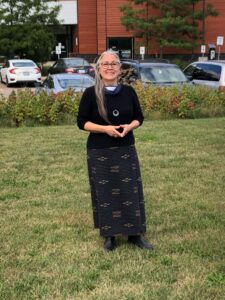
What is an elder in residence? Elders are the foundation of Indigenous communities and act as the glue that keeps our people together. They are the keepers of sacred stories, songs, language, culture and traditions. This position provides a critical role in our continued commitment to support indigenous perspectives, knowledge, and approaches to wellness are honoured in an education setting.
Aimee Bailey is our Elder-in-Residence. She is a Knowledge Keeper from the Algonquins of Pikwakanagan* First Nation, the Spokesperson for The Circle of Turtle Lodge, and an Algonquin College graduate. She also has an Honours Degree in the Humanities from York University and a postgraduate Certificate as a Traditional Practitioner from First Nations Technical Institute (FNTI). Being from the Sturgeon Clan, who are the educators in Traditional communities, Aimee would like you to think of her as a Reference Librarian, someone who could help you to find answers to any cultural questions you might have, either from knowledge and experience or by making connections to a wide and varied network of other Indigenous people she knows
Contact: Connect with Aimee
Email: aimee@thecircleofturtlelodge.ca
Kampus Kokum: Sherry Dion
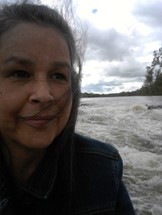 Ne’egweema—Uplifting Woman
Ne’egweema—Uplifting Woman
Adopted as granddaughter of the Anishinaabe Turtle Clan at 14 years old by Four Skies Grandfathers & Elders: Mishomish Peter O’Chiese, Abraham Burnstick, Eddie Bellrose, and Michael Thrasher of the Stoney Plains Cree Medicine People in Alberta.
Sherry Dion is an Algonquin of Pikwakanagan First Nation and a proud great-granddaughter of Chief Matthew Bernard and Christianne Aird Partridge. She is currently working as the Kampus Kokum at Algonquin College Pembroke Campus, carrying with her 45 years working knowledge of Traditional Medicine Wheels teachings through the natural world earth medicines. She uses these teachings as a source of deep healing and personal growth for herself and to guide Family, Community and Nation on the path forward.
Following in the footsteps of her ancestors from a young age, Sherry cultivated a deep-seated relationship with the interconnectedness of traditional spiritual and land-based cultural teachings. She has pursued a lifelong journey of wisdom from Sacred Natural Laws and Indigenous ways of knowing. She was initiated into the Traditional Medicine Wheel teachings and ceremonies 47 years ago, at the age of her 13th year ‘’Rite of Passage.’’ She initially learned these teachings as ‘’Helper’’ to Elder Michael Thrasher for 22 years, and continued learning traditional teachings from various Medicine People and Knowledge-Keepers throughout Turtle Island. She nurtures a deep love and gratitude with this spiritual connection to the lands and waters, plant medicines and animals that supports and sustains her well being.
Additionally, Sherry is a two-time graduate from Algonquin College. She graduated with honours from the Pembroke Campus Personal Support Worker Program. This prepared her for the role of caregiver to her mother diagnosed with cancer and to work in palliative care for family members in the community at Algonquins of Pikwakanagan First Nation. She has since retired from her work as a Personal Support Worker to grieve the loss of her mother, and to continue to heal from the intergenerational trauma as a 60s Scoop Survivor.
Sherry is also a graduate of Algonquin College’s 3-year Business Administration Program. She worked for the Federal Government during the volatile time of the fall of the Mulroney government when both the Ipperwash and Oka Crises took place. The ensuing actions to restore right relations for Indigenous Peoples included The Royal Commission on Aboriginal Peoples established in 1991 to examine and provide recommendations for the The United Nations Declaration of the Rights of Indigenous Peoples in 1992 which was not recognised by the Canadian government until 2021. Sherry’s political action, which includes raising cultural awareness programming for both Indigenous people and settlers, continues to this day.
Contact: Connect with Sherry
Email: dions@algonquincollege.com
Call: 613-735-4700 ext. 2840
Campus Drum & Drumkeeper
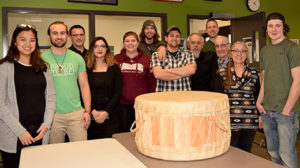 Working under the guidance of Indigenous Elders, Pembroke Campus students used traditional materials and craftsmanship to make our campus Drum. The Drum represents the circle of life. The Drum is made of wood and hide. These natural materials represent honesty and sharing. The wood comes from the trees and the trees tell us where life comes from. Without the sun and the earth, there would be no trees; there would be no life.
Working under the guidance of Indigenous Elders, Pembroke Campus students used traditional materials and craftsmanship to make our campus Drum. The Drum represents the circle of life. The Drum is made of wood and hide. These natural materials represent honesty and sharing. The wood comes from the trees and the trees tell us where life comes from. Without the sun and the earth, there would be no trees; there would be no life.
 Rhonda Mullin, Social Service Worker Coordinator is our Campus Drumkeeper. Her job is to tend to the Drum and make sure that it is never left alone. She also makes sure that nothing is done to disrespect the Drum, keeps it clean and never allows it to touch the ground.
Rhonda Mullin, Social Service Worker Coordinator is our Campus Drumkeeper. Her job is to tend to the Drum and make sure that it is never left alone. She also makes sure that nothing is done to disrespect the Drum, keeps it clean and never allows it to touch the ground.
Rhonda can be reached at mullinr@algonquincollege.com.
Medicine Wheel Garden
Located atop a hill at the western tip of the campus priority, the Indigenous Medicine Wheel Garden is a space for reflection, prayer and healing. The garden was dedicated at a special ceremony on June 2, 2023 where college President, Claude Brulé said, “This is a space for everyone. It is grounded in Indigenous culture, but dedicated in the spirit of inclusion.”
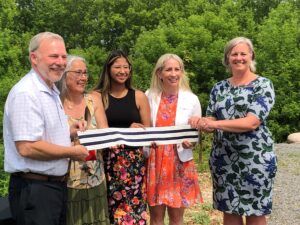 Most growing seasons, the garden includes many plants including geraniums, anemones, columbines, bergamot, cornflower, red ozier dogwood, black raspberries and blueberries. The garden includes park benches, a centre piece quartz rock and is located near a newly established arboretum that in the future will provide shade for visitors.
Most growing seasons, the garden includes many plants including geraniums, anemones, columbines, bergamot, cornflower, red ozier dogwood, black raspberries and blueberries. The garden includes park benches, a centre piece quartz rock and is located near a newly established arboretum that in the future will provide shade for visitors.
At the dedication ceremony, Social Services Worker student Stephania Smith said, “I believe today signifies the start of a journey towards reconciliation. As students at Algonquin college, we must recognize where supports are needed and advocate for them at the same time. I believe having a space where Indigenous students can connect with each other and navigate their own journeys of discovery at Algonquin College is a step forward. A space to feel welcome, to share stories, to practice culture, to share events with each other and the community. A space where we feel comfort with the scents of our traditional medicines,” added Smith.
Learn more about what a Medicine Wheel is.
Knowledge Sharing
Download the Three Sister Soup recipe
Download the Story of The Three Sisters
Learn more about oral-based knowledge systems which are traditional in many Indigenous cultures. In the podcast episode, Waubgeshig Rice, the bestselling author of ‘Moon of the Crusted Snow’, speaks to the weaving of oral tradition with his writing practice through his ability to tell a story before he ever sets pen to paper.
